Introduction
Hey there, pet owners! If you’ve ever wondered about the ideal diet for your precious rabbit, you’re not alone.
And guess what? One pesky little plant that seems to be everywhere actually plays a crucial role in a rabbit’s diet – dandelions!
I know what you’re thinking – dandelions? Those annoying weeds in my backyard?
They’re not just annoying plants, but powerful nutritional powerhouses! These vibrant flowers offer a rich source of vitamins, minerals, and fiber that are essential for your bunny’s overall well-being.
Did you know that dandelions also promote healthy digestion in rabbits? Their high fiber content helps maintain optimal gut health and prevents gastrointestinal issues.
Now, rabbits are not just physically active creatures – they have brilliant minds too. And that’s where dandelions come in to provide mental stimulation and enrichment.
Including dandelions in their diet allows them to engage in this instinctual behavior. Plus, the presence of dandelions in their enclosure stimulates their senses, offering a diverse range of textures and tastes.
So, are you ready to learn more about the significance of dandelions in a rabbit’s diet? Let’s dive deeper into the nutritional benefits, ways to incorporate dandelions into their meals, and some cautionary notes to keep in mind.
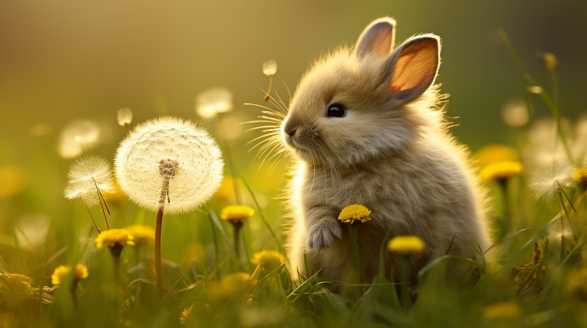
Key Takeaways
- Dandelions are a valuable addition to a rabbit’s diet, offering numerous health benefits.
- Dandelions are packed with essential vitamins and minerals such as vitamins A, C, and K, calcium, and iron.
- Dandelions promote healthy digestion and act as a gentle laxative for rabbits.
- Providing dandelions stimulates natural foraging behavior in rabbits, offering both mental stimulation and physical enrichment.
- Fresh dandelion leaves, flowers, and dried roots can be incorporated into a rabbit’s diet in various ways.
- It is important to ensure that dandelions are pesticide-free and to introduce them gradually into a rabbit’s diet.
- Rabbits can enjoy a mix of fresh and dried dandelions, considering factors such as convenience, nutritional value, and variety in their diet.
- While dandelion allergies are rare in rabbits, it’s important to monitor for any adverse reactions and consult a veterinarian if necessary.
- Wild rabbits also enjoy dandelions as part of their natural diet, and providing a safe habitat with dandelions can attract and support their well-being.
The Role of Dandelions in a Rabbit’s Natural Diet
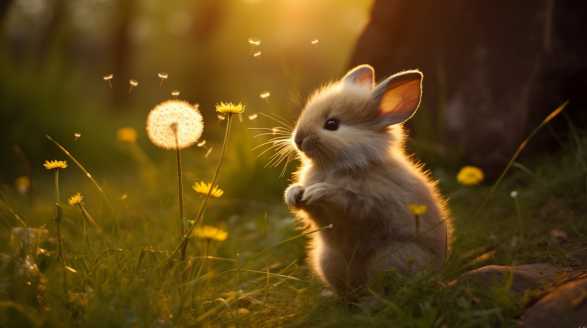
As a pet owner, you may have often wondered about the ideal diet for your beloved rabbit. You want to ensure they receive all the necessary nutrients from a diet that mimics their natural habitat.
Dandelions, often considered as pesky weeds, have a surprising number of benefits for rabbits. They offer a rich source of vitamins, minerals, and fibers that are essential for your bunny’s overall well-being.
The Nutritional Powerhouses
Dandelions are packed with essential vitamins and minerals that contribute to a rabbit’s health. Let’s take a look at some key nutrients found in these vibrant flowers:
- Vitamin A: Dandelions are abundant in this essential vitamin, which plays a crucial role in maintaining healthy eyesight, boosting the immune system, and promoting optimal growth.
- Vitamin K: Essential for blood clotting, dandelions are a great source of this vitamin that helps prevent excessive bleeding in rabbits.
- Vitamin C: Known for its antioxidant properties, vitamin C is vital for collagen synthesis, wound healing, and strengthening the immune system.
- Calcium: Dandelions offer a natural source of calcium, assisting in strong bone development and maintaining healthy teeth.
- Trace Minerals: Dandelions are rich in trace minerals such as magnesium, iron, and potassium, which aid in various bodily functions including enzyme production, oxygen transportation, and muscle function.
Natural Digestive Aid
Including dandelions in a rabbit’s diet can promote healthy digestion. The high fiber content in dandelions helps maintain optimal gut health and prevents gastrointestinal issues.
- Fiber: Dandelions are an excellent source of dietary fiber, promoting regular bowel movements and preventing constipation in rabbits. The fiber also helps wear down their teeth naturally, preventing dental problems.
- Gentle Laxative: Dandelions contain a gentle laxative effect, aiding in the prevention of hairballs and keeping the digestive system running smoothly.
Enrichment and Mental Stimulation
Rabbits are intelligent creatures, and their well-being extends beyond just physical health. Providing them with a varied and stimulating diet is essential for their mental enrichment.
- Foraging Benefits: Rabbits are natural foragers, spending hours in the wild searching for food. Including dandelions in their diet allows them to engage in this instinctual behavior.
- Environmental Enrichment: The presence of dandelions in a rabbit’s enclosure stimulates their senses and offers a diverse range of textures and tastes, providing mental stimulation and preventing boredom.
Healthy Snack Ideas
Now that we understand the importance of dandelions in a rabbit’s natural diet, let’s explore some creative ways to incorporate them into their meals:
- Fresh Dandelion Leaves: Pluck fresh dandelion leaves and add them to your rabbit’s daily salad. Ensure that the leaves are pesticide-free and thoroughly washed before serving.
- Dandelion Flowers: Offer dandelion flowers as a tasty treat. Rabbits love nibbling on the vibrant yellow petals, and it’s a great way to provide them with mental stimulation.
- Dried Dandelion Roots: Dandelion roots can be dried and offered as an occasional chew toy. This not only adds variety to your rabbit’s diet but also helps wear down their ever-growing teeth.
Cautionary Notes
While dandelions offer numerous benefits to rabbits, it’s crucial to exercise caution and follow these guidelines:
- Pesticide-Free: Ensure the dandelions you feed your rabbit are free from pesticides, herbicides, or any other harmful substances that can be toxic to them.
- Moderation: Although dandelions are packed with nutrients, they should be fed as a part of a balanced diet. Introduce them gradually, and monitor your rabbit’s response.
Dandelions play a vital role in a rabbit’s natural diet, offering an array of nutritional benefits and mental stimulation. By incorporating these vibrant flowers into your rabbit’s meals, you contribute to their overall health and well-being.
So go ahead, embrace the power of dandelions, and watch your furry friend thrive!
Common Dandelion Varieties that Rabbits Love
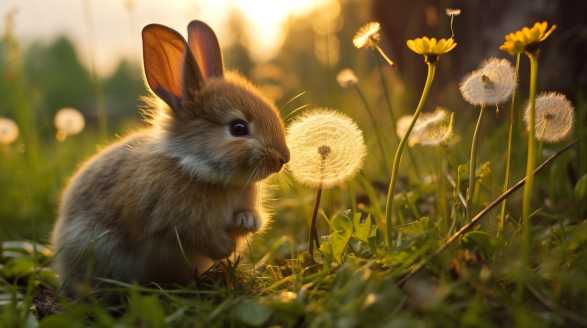
If you have a pet rabbit, you know how important it is to provide them with a varied and nutritious diet. While commercial rabbit pellets are readily available, it’s always a good idea to supplement their diet with fresh, natural foods.
Not only are dandelions tasty, but they also offer numerous health benefits for your furry friend. we will explore some common dandelion varieties that rabbits love.
Why do rabbits love dandelions?
Rabbits are herbivores, and their diets primarily consist of grasses, vegetables, and leafy greens. Dandelions are highly palatable to rabbits due to their slightly bitter and tangy taste.
Dandelions are rich in vitamins A, C, and K, which help support your rabbit’s immune system and promote healthy growth. They are also packed with minerals like calcium, iron, and potassium, which contribute to strong bones and teeth.
Common dandelion varieties for rabbits
1. Taraxacum officinale
Taraxacum officinale, also known as the common dandelion, is the most widespread type of dandelion. It is found throughout North America, Europe, and Asia.
The common dandelion also produces vibrant yellow flowers, which rabbits can enjoy as an occasional treat.
2. Taraxacum erythrospermum
Taraxacum erythrospermum, often referred to as the red-seeded dandelion, is another variety that rabbits find irresistible. This species is native to Europe and Asia and is distinguished by its reddish-brown seeds.
3. Taraxacum laevigatum
Taraxacum laevigatum, commonly known as the smooth dandelion, is native to Europe and can be found in various parts of the United States. This species is recognized by its smooth, hairless leaves, which rabbits find particularly delightful.
4. Taraxacum ceratophorum
Taraxacum ceratophorum, also known as the horned dandelion, is a less common variety but equally loved by rabbits. Its name comes from the horn-like appendages on its seeds, which give it a unique appearance.
Rabbits enjoy its tender leaves, appreciating the slight bitterness they offer.
How to prepare dandelions for your rabbit
When offering dandelions to your rabbit, it is essential to ensure they are free from pesticides or other harmful chemicals. It’s always best to pick them from your garden or select organic options from a trusted source.
- Wash the dandelions thoroughly: Remove any dirt or debris by rinsing the leaves and flowers with cool water. Make sure to gently pat them dry before serving.
- Trim the stems: Rabbits find the stems of dandelion leaves tough to chew, so it’s a good idea to trim them to make the leaves more manageable.
- Serve in moderation: While rabbits love dandelions, it’s important not to overfeed them. Introduce dandelions gradually into their diet to avoid any digestive issues.
Other ways to incorporate dandelions into your rabbit’s diet
Aside from offering fresh dandelions, there are a few other ways you can include this beloved plant in your rabbit’s meals:
- Dandelion hay: Drying dandelions and turning them into hay is a great way to provide your rabbit with a tasty treat that can be stored and enjoyed over time.
- Dandelion greens: Blend fresh dandelion greens with other leafy vegetables to create a nutrient-rich salad for your bunny. Ensure that the greens are finely chopped to aid in digestion.
- Dandelion root: Dandelion roots are edible and can be included in your rabbit’s diet. However, it’s best to consult with a veterinarian before introducing them, as some rabbits may have sensitivities.
Dandelions are not just common garden weeds; they are a rabbit’s delight. With their nutritional benefits and delicious taste, dandelions make a fantastic addition to your rabbit’s diet.
Remember, a happy and healthy rabbit is a well-fed rabbit.
Dandelions: A Natural Diuretic for Rabbits
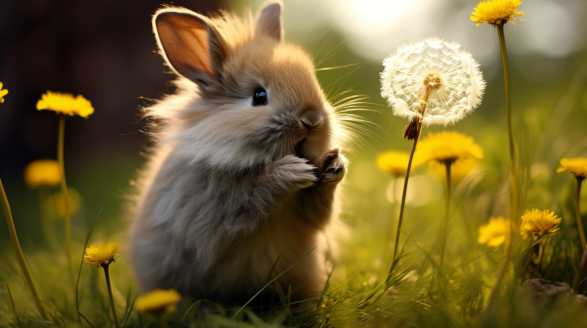
Are you a rabbit owner looking for a natural solution to help support your furry friend’s urinary health? Look no further than dandelions!
In fact, dandelions are known to have diuretic properties that can help promote healthy urine flow in rabbits.
The Benefits of Dandelions for Rabbits
Dandelions offer a multitude of benefits for rabbits, especially when it comes to their urinary system. Here are some of the key advantages of incorporating dandelions into your bunny’s diet:
- Diuretic Properties: Dandelions act as a gentle diuretic for rabbits, helping increase urine production and promoting regular bladder function. This can be particularly beneficial for rabbits prone to urinary tract problems.
- Hydration: Dandelions are rich in water content, which can contribute to keeping your rabbit hydrated. Adequate hydration is essential for maintaining proper urinary health in rabbits.
- Urinary Tract Health: By encouraging increased urine flow, dandelions can help prevent the formation of urinary crystals and stones. These conditions can be painful and potentially life-threatening for rabbits.
- Nutritional Value: Dandelions are packed with essential nutrients, including vitamins A, C, and K, as well as minerals like calcium, iron, and potassium. Adding dandelions to your rabbit’s diet can provide a well-rounded source of nutrition.
How to Safely Incorporate Dandelions into Your Rabbit’s Diet
Before introducing any new food to your rabbit, it’s crucial to ensure its safety and suitability. Here are some important considerations when offering dandelions to your furry friend:
Choose Organic or Pesticide-Free Dandelions
Dandelions that have been exposed to pesticides or herbicides can be harmful to rabbits. It’s best to select dandelions from areas where no chemical treatments have been used.
Introduce Dandelions Gradually
As with any new food, it’s essential to introduce dandelions slowly and in small quantities. Begin by offering a few dandelion leaves and monitor your rabbit’s response.
Rinse Thoroughly
Before feeding dandelions to your rabbit, make sure to rinse them thoroughly to remove any dirt, insects, or pesticides. This extra step ensures that your bunny gets only the beneficial nutrients without any potential contaminants.
Dandelion and Rabbit Diet
While dandelions can be a healthy addition to your rabbit’s diet, it’s essential to maintain a balanced and varied food selection. Here are a few tips on incorporating dandelions into your bunny’s eating routine:
1. Dandelions as Treats
Dandelions can be an excellent treat option for your bunny. Offer a few leaves or flowers occasionally as a special reward.
2. Dandelion Leaf Hay
To provide your rabbit with a constant supply of dandelions, you can create dandelion leaf hay. Harvest the leaves, rinse them thoroughly, and allow them to dry completely.
3. Blending with Other Foods
Mixing dandelion leaves with your rabbit’s regular leafy greens or herbs can enhance the nutritional value of their meals. Experiment with different combinations to find the flavors your bunny loves.
Common Concerns and Precautions
While dandelions can offer numerous benefits to rabbits, it’s essential to keep a few concerns in mind:
Limit Quantity
As with any food, moderation is key. While dandelions are nutritious, feeding excessive amounts can upset your rabbit’s digestive system.
Allergies or Sensitivities
While rare, some rabbits may have allergies or sensitivities to dandelions. Monitor your bunny’s response when introducing this new food and consult with a veterinarian if any adverse reactions occur.
Avoid Pesticides
We cannot stress enough the importance of avoiding dandelions treated with pesticides. Chemicals used in yards and gardens can be toxic to rabbits.
Dandelions are not just pesky weeds; they can be a valuable addition to your rabbit’s diet, promoting urinary health and providing essential nutrients. However, as with any dietary change, it’s essential to introduce dandelions gradually and monitor your bunny’s response.
So, go ahead and embrace these sunny flowers for the benefit of your rabbit’s urinary health!
How to Safely Feed Dandelions to Your Pet Rabbit
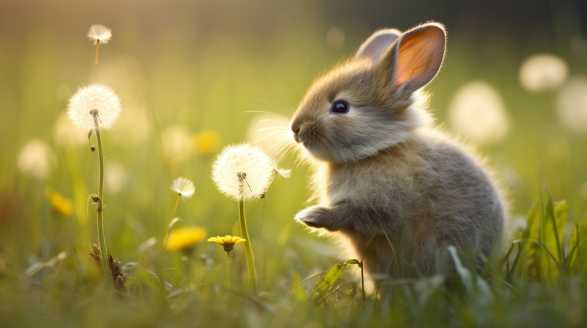
If you’ve ever watched a rabbit graze in a meadow, you may have wondered about the possibility of incorporating dandelions into your pet rabbit’s diet. Well,!
we will explore the benefits of feeding dandelions to your pet rabbit and provide you with some handy tips to ensure a safe and enjoyable experience for your furry friend.
Why should you consider feeding dandelions to your rabbit?
Dandelions are not just pesky weeds that invade your garden; they are actually a powerhouse of nutrition for rabbits. They offer a range of health benefits and can be a tasty treat for your furry companion.
- Nutritional value: Dandelions are rich in vitamins A, C, and K, as well as calcium and iron. These nutrients are essential for your rabbit’s overall health and well-being.
- Fiber content: Rabbits require a high-fiber diet to maintain their digestive system’s proper functioning, and dandelions are a great source of dietary fiber.
- Hydration: Dandelions contain a significant amount of water, which can contribute to your rabbit’s overall hydration.
- Enrichment: Incorporating new foods into your rabbit’s diet can provide mental stimulation and keep them entertained.
How to safely gather dandelions for your rabbit:
Before you start feeding dandelions to your pet rabbit, it is crucial to ensure that they are safe for consumption. Follow these steps to gather dandelions safely:
- Chemical-free environment: Make sure to collect dandelions from an area that is free from pesticides, herbicides, and other chemicals that could be harmful to your rabbit.
- Avoid roadside dandelions: Dandelions growing near roadsides are prone to pollution and may have absorbed harmful substances from passing vehicles. It is best to steer clear of these when gathering greens for your rabbit.
- Hand-picking: The safest way to gather dandelions is to pick them by hand, ensuring there are no other plants or contaminants mixed in.
- Wash thoroughly: Once you have collected the dandelions, give them a good rinse under cool water to remove any dirt, debris, or potential residue.
How to introduce dandelions into your rabbit’s diet:
Now that you have safely gathered dandelions, it’s time to introduce them to your rabbit. Follow these steps for a smooth transition:
- Start small: Begin by offering a few small leaves of dandelion to your rabbit as a treat. This allows their digestive system to adjust to the new food gradually.
- Observe your rabbit: Pay close attention to how your rabbit reacts to the dandelions. Some rabbits may develop an upset stomach or have allergic reactions to new foods. If you notice any adverse effects, discontinue feeding dandelions and consult a veterinarian.
- Incremental increase: Once your rabbit has become accustomed to dandelion treats, gradually increase the amount you offer. This will help prevent digestive upsets.
Do’s and Don’ts when feeding dandelions to your rabbit:
To ensure a safe and enjoyable experience for both you and your pet rabbit, here are some do’s and don’ts to keep in mind:
Do’s:
- Do offer dandelions as occasional treats, along with a balanced diet of hay, fresh vegetables, and pellets.
- Do wash dandelions thoroughly to remove any potential contaminants.
- Do feed organic dandelions whenever possible to minimize the risk of chemical exposure.
- Do consult a veterinarian if you have any concerns about introducing dandelions or notice any adverse reactions in your rabbit.
Don’ts:
- Don’t make dandelions the sole source of food for your rabbit, as they still need a diverse diet to meet all their nutritional requirements.
- Don’t feed dandelions purchased from stores unless they are specifically labeled as safe for rabbit consumption.
- Don’t feed wilted or moldy dandelions, as they can cause digestive issues or illness.
- Don’t overfeed dandelions, as an excessive intake can lead to gastrointestinal disturbances.
Dandelions can be a delightful addition to your pet rabbit’s diet. With their abundant nutritional value and potential for mental enrichment, these humble weeds can offer your furry friend a tasty and healthy treat.
By following these guidelines, you can safely feed dandelions to your pet rabbit and contribute to their overall well-being and happiness.
The Nutritional Benefits of Dandelions for Rabbits
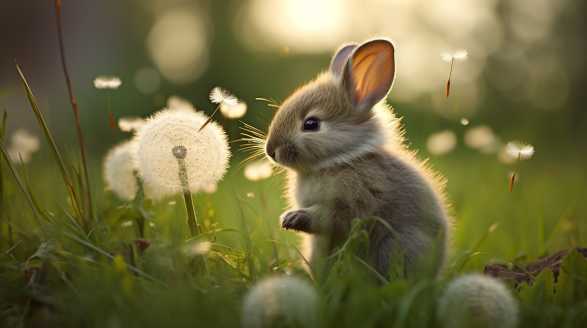
Rabbits are adorable, cuddly creatures that make great pets. As responsible rabbit owners, it is essential for us to ensure that our furry friends receive a well-balanced diet.
What Are Dandelions?
Dandelions are common yellow flowers that many people consider to be weeds. However, these humble flowers are packed with nutrition and can be a wonderful addition to your rabbit’s diet.
Nutritional Profile of Dandelions
Dandelions are not only rich in vitamins and minerals but also low in calories, making them an excellent choice for rabbits’ health. Let’s take a closer look at the nutritional benefits dandelions offer:
- Vitamins: Dandelions are a fantastic source of vitamins, including Vitamin A, Vitamin C, Vitamin K, and several B vitamins. These vitamins are crucial for maintaining a rabbit’s overall health, boosting their immune system, and promoting healthy growth.
- Minerals: Dandelions are packed with essential minerals such as calcium, potassium, iron, and magnesium. These minerals are vital for strong bones, muscle function, and proper digestion in rabbits.
- Fiber: Dandelions are high in fiber, which is important for maintaining a rabbit’s digestive health. Fiber aids in proper digestion, prevents gastrointestinal issues, and reduces the risk of obesity in rabbits.
- Antioxidants: Dandelions are rich in antioxidants that help protect rabbits’ cells from damage caused by harmful free radicals. These antioxidants can contribute to overall wellness and longevity in our furry friends.
Adding Dandelions to Your Rabbit’s Diet
Now that we know how beneficial dandelions can be for rabbits, here are a few tips to incorporate them into your furry friend’s diet:
1. Foraging for Dandelions
If you have a safe, pesticide-free garden, you can let your rabbit forage for dandelions on their own. It provides them with mental stimulation and mimics their natural behavior.
2. Store-Bought Dandelion Greens
Many pet stores and grocery stores now carry fresh dandelion greens specifically for rabbits. These pre-packaged greens are a convenient option for those who don’t have access to dandelions or a garden.
3. Drying Dandelion Greens
If you have an abundance of dandelion greens, you can dry them for future use. To do this, wash the greens thoroughly and spread them out in a single layer on a baking sheet.
This way, you can have a supply of dandelions for your rabbit all year round.
4. Moderation is Key
While dandelions offer numerous benefits, it is crucial to remember that moderation is key. Too much of anything can be harmful, and dandelions should be given as a treat or supplement to your rabbit’s regular diet.
Cautionary Considerations
Although dandelions are generally safe for rabbits, there are a few considerations to keep in mind:
1. Pesticide-Free Dandelions
Always ensure that the dandelions you offer your rabbit are pesticide-free. Pesticides can be extremely harmful to rabbits’ delicate systems.
2. Introduce Gradually
When adding dandelions or any new food to your rabbit’s diet, introduce it gradually. Sudden changes in their diet can cause digestive upset.
3. Allergies and Individual Sensitivities
Just like humans, rabbits can have individual sensitivities or allergies to certain foods. Before introducing dandelions into your rabbit’s diet, monitor for any adverse reactions.
Adding dandelions to your rabbit’s diet can provide them with a wide array of vital nutrients while also introducing variety and enrichment to their meals. Remember to always prioritize the health and safety of your furry friend by offering pesticide-free dandelions in moderation.
Can Rabbits Overeat Dandelions? Finding the Right Balance
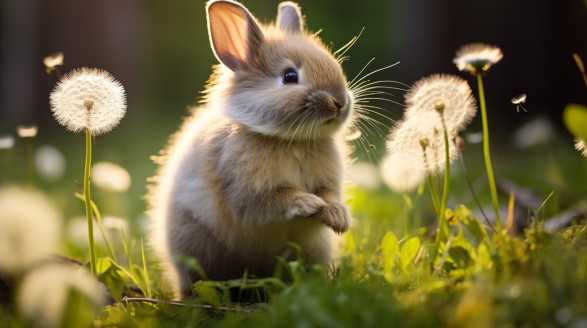
Many rabbit owners enjoy offering dandelions as a healthy and appealing treat for their furry companions. While these bright yellow flowers are abundant in nature and seem harmless, it’s crucial to understand the impact they can have on a rabbit’s overall health.
Exploring the Rabbit’s Love for Dandelions
Why do rabbits find dandelions irresistible?
Rabbits are naturally drawn to dandelions due to their strong smell and tasty flavor. These leafy green plants boast a high nutritional profile, making them a valuable addition to a rabbit’s diet.
The Nutritional Benefits of Dandelions
Dandelions are rich in vitamins, minerals, and fiber, which are essential for a rabbit’s well-being. Here are some of the key nutritional benefits dandelions offer:
- Vitamin A: Dandelions are particularly high in vitamin A, promoting healthy vision, skin, and immune function in rabbits.
- Vitamin K: This vitamin supports proper blood clotting and bone health.
- Iron, Calcium, and Magnesium: Dandelions provide these minerals, aiding in the maintenance of strong bones and teeth.
- Fiber: A significant component in a rabbit’s diet, fiber ensures healthy digestion and prevents gastrointestinal issues.
The Risks of Overindulging in Dandelions
As much as rabbits adore dandelions, consuming excessive amounts can lead to health problems. It is crucial to strike a balance between providing these treats and maintaining a well-rounded diet for your pet.
Digestive Upset
Dandelions contain a high water content and are relatively low in protein, which can upset a rabbit’s delicate digestive system if eaten in excess. Overindulging can cause loose stools or diarrhea, leading to hydration issues and nutrient deficiencies.
Dental Concerns
While rabbits need to gnaw on fibrous food to keep their teeth healthy, too much of a good thing can be detrimental. Dandelions, when consumed excessively, may contribute to tooth decay and dental problems in rabbits.
Finding the Right Balance
Balancing a rabbit’s diet requires careful attention to portion control and a diverse range of food options. Here are a few tips to ensure your rabbit enjoys dandelions without compromising their health:
1. Serve Dandelions as Occasional Treats
Rather than offering dandelions daily, consider incorporating them as a special treat a couple of times a week. This way, rabbits can enjoy the taste and receive nutritional benefits without overloading their system.
2. Monitor Serving Sizes
When giving dandelions to your furry friend, it’s essential to control the portion size. A handful of dandelion leaves or a single flower can be sufficient for a treat.
3. Rotate Treat Options
Diversify your rabbit’s treat options to ensure they receive a wide range of nutrients. Instead of relying solely on dandelions, consider introducing other safe and nutritious options, such as kale, parsley, or cilantro.
While rabbits can enjoy the occasional indulgence in dandelions, finding the right balance is key to their overall well-being. These vibrant flowers offer numerous nutritional benefits but can also pose health risks if consumed excessively.
Remember, moderation is the key to maintaining an optimal balance in your pet’s diet.
The Differences Between Dried and Fresh Dandelions for Rabbits
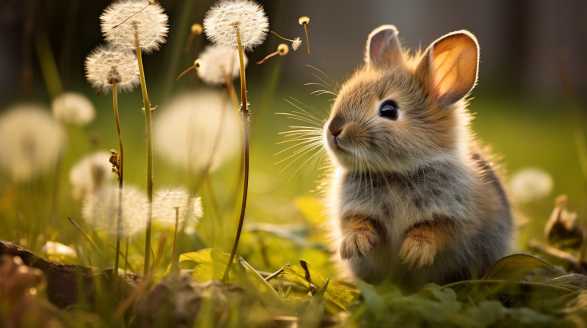
Rabbits are adorable creatures that make wonderful pets. They require a certain diet to maintain their health and well-being.
Dandelions are not only readily available in most regions but also packed with nutritional benefits. However, when it comes to feeding dandelions to rabbits, there are two primary options: dried or fresh.
Dried Dandelions: A Convenient Option
Drying dandelions is a common method used to preserve them for extended periods. It offers several advantages, especially when it comes to convenience.
- Year-round availability: Dried dandelions can be found in stores or easily obtained online throughout the year. Unlike fresh dandelions, which may have a seasonal availability, dried ones are readily accessible whenever you need them.
- Longer shelf life: Drying dandelions significantly extends their shelf life. This means you can stock up on dried dandelions without worrying about spoilage. It’s an excellent option for rabbit owners who prefer to store large quantities of food at once.
- Portability and storage: Dried dandelions are lightweight and take up minimal space. This makes them ideal for carrying during travel or storing in limited spaces. Whether you’re going on a vacation or have limited storage options, dried dandelions provide convenience and ease of use.
- Concentrated nutrients: Believe it or not, drying dandelions actually concentrates their nutritional value. The drying process removes much of the water content while retaining essential nutrients. So, when you feed dried dandelions to your rabbit, they are getting a nutrient-dense food source.
Fresh Dandelions: A Natural Delight
While dried dandelions offer convenience, fresh dandelions have their unique advantages too. Here’s a closer look at why providing your rabbit with fresh dandelions can be beneficial:
- Variety and freshness: Rabbits, like humans, appreciate fresh food options. Freshly picked dandelions provide a variety in taste, texture, and aroma that dried dandelions simply cannot replicate. Plus, offering fresh food adds an element of excitement to your rabbit’s diet.
- Hydration: Fresh dandelions are rich in water content, which contributes to your rabbit’s hydration. Especially during hot summer months, fresh dandelions can help keep your furry friend properly hydrated. The high water content also aids in digestion and prevents certain health issues.
- Natural foraging experience: Rabbits are natural foragers. They love searching for food and enjoy the physical and mental stimulation it provides. Fresh dandelions allow you to recreate a more natural foraging experience for your rabbit, as they mimic the type of food rabbits would encounter in the wild.
- Higher vitamin C levels: Drying dandelions may lead to a loss of some heat-sensitive vitamins, such as vitamin C. Fresh dandelions, on the other hand, retain their natural vitamin C levels. Vitamin C is crucial for rabbits as it aids in their overall health and immune system function.
Which One Should You Choose?
Both dried and fresh dandelions have their own merits, and the decision ultimately depends on your specific circumstances and preferences. Consider the following factors when making a choice:
- Convenience: If you prioritize convenience, dried dandelions are an excellent choice. They are easily accessible, have a long shelf life, and are convenient for travel or storage.
- Nutritional value: If you aim to provide your rabbit with concentrated nutrients, dried dandelions are the way to go. The drying process enhances the concentration of essential nutrients.
- Variety and freshness: For added variety and a more natural experience, opt for fresh dandelions. They provide a fresher taste, maintain higher vitamin C levels, and enable your rabbit to engage in their natural foraging behavior.
- Seasonal availability: Keep in mind that fresh dandelions may have limited availability during certain times of the year. However, if you can obtain fresh dandelions regularly, they are a great addition to your rabbit’s diet.
Both dried and fresh dandelions offer distinct benefits when it comes to feeding your rabbit. While dried dandelions provide convenience and concentrated nutrients, fresh dandelions offer variety, hydration, and a natural foraging experience.
Remember, a balanced diet that incorporates both options will likely provide the best overall nutrition for your furry friend.
Do Rabbits Develop Allergies to Dandelions?
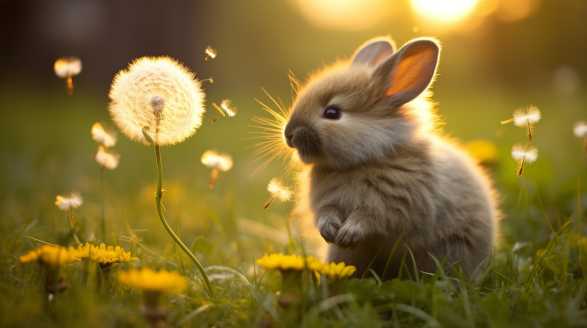
When it comes to adorable pets, rabbits often take the center stage. These furry creatures are known for their love of munching on fresh greens and vegetables.
we will explore this perplexing question and provide you with all the information you need to know about rabbits and dandelion allergies.
Are Rabbits Prone to Allergies?
Before delving specifically into dandelion allergies, it’s important to understand if rabbits are prone to allergies in general. While rabbits, much like humans, can be susceptible to allergies, their triggers and reactions may differ.
However, allergies to specific plants, like dandelions, are relatively rare.
Understanding Dandelions
What are Dandelions?
Dandelions, scientifically known as Taraxacum officinale, are a common plant found in many parts of the world. They are characterized by bright yellow flowers and fluffy seed heads that disperse when blown by the wind.
Nutritional Value of Dandelions for Rabbits
Rabbits are herbivores and rely on a diet rich in fiber and various nutrients. Dandelions have several health benefits for rabbits:
- High fiber content: Dandelions are an excellent source of fiber, which helps maintain proper digestion in rabbits.
- Essential nutrients: Dandelions contain vitamins A, C, and K, as well as calcium and iron, which contribute to a well-rounded diet for rabbits.
- Hydration: Dandelions have a high water content, which can help keep rabbits hydrated.
Can Rabbits Develop Allergies to Dandelions?
While rabbits are not commonly allergic to dandelions, there have been rare cases where individual rabbits have shown allergic reactions. It’s important to remember that each rabbit is unique, and just like humans, they can have varying sensitivities to different substances.
Signs of Dandelion Allergies in Rabbits
If a rabbit is allergic to dandelions, they may exhibit the following symptoms:
- Runny nose
- Sneezing
- Watery eyes
- Itchy skin
- Swelling or rash around the mouth or face
If you notice any of these signs after your rabbit has consumed dandelions, it’s best to consult a veterinarian for proper diagnosis and guidance.
Prevention and Treatment
Avoidance
If you suspect your rabbit has a dandelion allergy or simply want to take preventive measures, you can consider avoiding dandelions in their diet. However, it’s essential to provide alternative greens and vegetables to ensure your rabbit receives proper nutrition.
Consult a Veterinarian
If your rabbit displays symptoms of an allergic reaction to dandelions, visiting a veterinarian is crucial. They can perform tests to determine if it is indeed a dandelion allergy and provide appropriate treatment options.
Introduce Gradually
If you are unsure about your rabbit’s sensitivity to dandelions, it’s advisable to introduce small amounts gradually. Monitor their behavior and look for any signs of a reaction.
Other Plants and Foods to Consider
While dandelions are one of the many greens rabbits can enjoy, there is a wide variety of safe plants and foods suited for their diet. Here are some popular choices:
- Leafy greens: Lettuce (romaine, green leaf, and red leaf), spinach, and kale are excellent options for rabbits.
- Herbs: Parsley, cilantro, and mint can provide both taste and nutritional benefits for rabbits.
- Safe vegetables: Carrots, bell peppers, and broccoli can be included in your rabbit’s diet in moderation.
Remember, moderation is key when introducing new foods, and always monitor your rabbit’s reaction to ensure their overall well-being.
While dandelion allergies are not common in rabbits, it’s important to be observant and responsive to your furry friend’s needs. If you suspect an allergic reaction to dandelions or any other substance, consulting a veterinarian is always the best course of action.
Do Wild Rabbits Also Eat Dandelions?
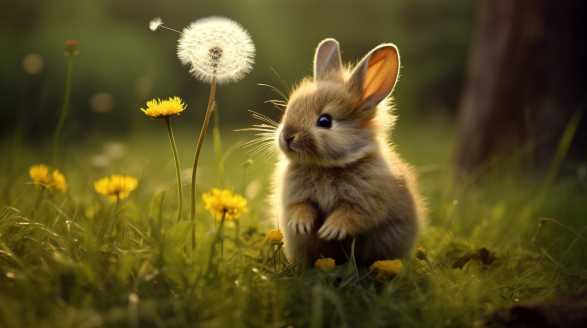
If you’ve ever observed wild rabbits hopping around your backyard or garden, you may have wondered about their dietary preferences. After all, these fluffy creatures are known to nibble on a variety of greens, from grasses to vegetables.
we will dive into the intriguing world of rabbits and their affinity for dandelions, exploring their diet, behavior, and potential health benefits. So let’s dig in!
Understanding Wild Rabbit Diets
To understand whether wild rabbits eat dandelions, we must first establish their overall dietary habits. Wild rabbits, also known as cottontail rabbits, are herbivores.
Their diet consists mostly of grasses, leaves, bark, twigs, and even some fruits and vegetables. As creatures of opportunity, wild rabbits are adaptable and will venture into various habitats to find suitable nutrition sources.
Wild Rabbit Diet: A Deeper Look
Wild rabbits are grazing animals, spending a significant portion of their time searching for food. Their diet varies depending on factors such as season, habitat, and availability.
Here are some common plants that are commonly on the rabbit menu:
- Clover
- Blackberry bush leaves
- Plantain leaves
- Yarrow flowers
- Leafy greens like kale and lettuce
- Herbs like cilantro and parsley
The Curious Case of Dandelions
The disheveled appearance of dandelions might lead one to believe they are undesirable. Yet, their abundance in many gardens makes it important to understand whether wild rabbits find them appealing.
The Enticing Flavor of Dandelions
Dandelions aren’t solely seen as pesky weeds; they boast a unique taste that attracts various creatures, including wild rabbits. Young dandelion leaves are tender and palatable to rabbits, making them an attractive food source.
Dandelions: A Safe and Nutritious Choice
Not only do wild rabbits eat dandelions, but they also reap several nutritional benefits from this humble plant. Dandelions are a rich source of vitamins A, C, and K, as well as calcium, iron, and manganese.
Dandelions are also known for their diuretic properties, aiding in the regulation of a rabbit’s digestion and urinary system.
Encountering Wild Rabbits and Dandelions
If you’re keen on attracting wild rabbits to your yard or want to ensure their well-being, providing a safe haven abundant with dandelions can be rewarding. Here are a few tips:
1. Natural Habitat Preservation
To make your space rabbit-friendly, it’s important to maintain a natural habitat. Designate areas where wildflowers, including dandelions, can flourish.
2. Planting Dandelions in Your Garden
Consider creating a designated dandelion patch within your garden. By cultivating this space, you not only attract wild rabbits but also enjoy the visual appeal of these cheerful yellow blooms.
Providing a balanced ecosystem encourages wildlife to thrive.
3. Avoid Overfeeding
While wild rabbits do enjoy and benefit from eating dandelions, it’s important not to overfeed them or provide an excessive quantity of dandelions. A varied diet is crucial for their overall health.
Wild rabbits do indeed have a fondness for dandelions. The bitter yet flavorful taste, coupled with their nutritional benefits, make dandelions an appealing addition to their diet.
So if you spot a rabbit nibbling on those vibrant yellow flowers, know that dandelions are a delightful part of their feasting repertoire.
Conclusion
In conclusion, dandelions are not just annoying weeds in your backyard – they are nutritional powerhouses for rabbits! These vibrant flowers offer a wide range of benefits for our furry friends, from providing essential vitamins and minerals to promoting healthy digestion and mental stimulation.
Dandelions are packed with vitamins A, C, and K, as well as vital minerals like calcium and iron. These nutrients support various bodily functions and help maintain healthy eyesight, strong bones, and a robust immune system for our rabbits.
Providing dandelions for our rabbits not only satisfies their nutritional needs but also stimulates their natural foraging behavior. Rabbits are intelligent creatures that need mental stimulation, and dandelions offer a fun and tasty way to engage their senses.
When introducing dandelions into a rabbit’s diet, it is important to ensure they are pesticide-free and to start with small quantities. Monitoring our rabbits’ response and gradually increasing the amount over time helps prevent any digestive upset or allergic reactions.
Whether you choose to offer fresh dandelions or opt for the convenience of dried options, it’s important to prioritize your rabbit’s well-being. By incorporating dandelions into their meals, we provide them with a wholesome snack and contribute to their overall happiness and health.
So, next time you come across a dandelion in your garden, consider it as more than just a weed – it’s a delightful treat for your precious rabbit! Embrace the power of dandelions and watch your furry friend thrive.
Frequently Asked Questions
Do rabbits eat dandelions?
Yes, rabbits do eat dandelions. Dandelions are a common and nutritious part of a rabbit’s diet.
Are dandelions safe for rabbits to eat?
Yes, dandelions are safe for rabbits to eat as long as they are pesticide-free and have not been exposed to any harmful chemicals.
How often should I feed my rabbit dandelions?
Dandelions can be given to rabbits as a treat on an occasional basis. It is recommended to limit the amount of dandelions to a small handful a few times a week.
Can rabbits eat all parts of the dandelion plant?
Rabbits can eat all parts of the dandelion plant, including the leaves, stems, and flowers. However, it is important to remove any dirt or debris before feeding them to your rabbit.
Are there any health benefits of feeding dandelions to rabbits?
Yes, dandelions are rich in vitamins A, C, and K, as well as minerals like calcium and potassium, which can contribute to a rabbit’s overall health and well-being.
Can rabbits eat dandelions from the wild?
It is generally safe for rabbits to eat dandelions from the wild, as long as the area has not been treated with pesticides or herbicides. However, it is recommended to wash and thoroughly inspect any wild dandelions before feeding them to your rabbit.
Can feeding dandelions cause any health problems for rabbits?
Feeding dandelions in moderation is unlikely to cause any health problems for rabbits. However, overfeeding any type of treat can lead to digestive issues, so it is important to offer dandelions as part of a balanced diet.
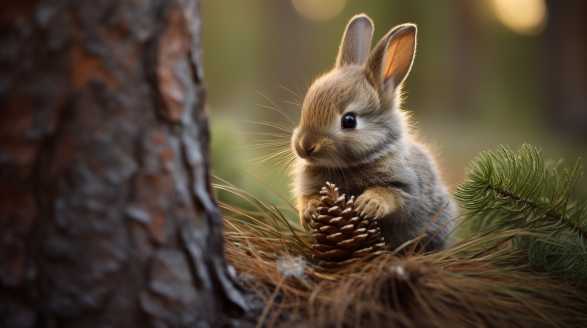
Do Rabbits Eat Pine Cones
Introduction Can rabbits eat pine cones? Let’s find out. Get ready to dive into a world of excitement and discovery as we explore the fascinating topic of feeding pine cones to our furry friends. I couldn’t help but put on my investigative hat and go down the rabbit hole (pun intended) to bring you all […]
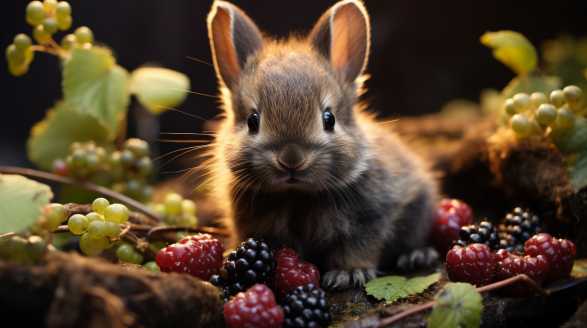
What Berries Can Rabbits Eat
Introduction Hey there, fellow bunny lovers! Are you ready to embark on a berry-tastic journey with me? What Berries can Rabbits eat? Let’s find out Not all berries are created equal when it comes to our precious bunnies. That’s why I’m here to guide you on this wild and berry-filled adventure, ensuring that you provide […]
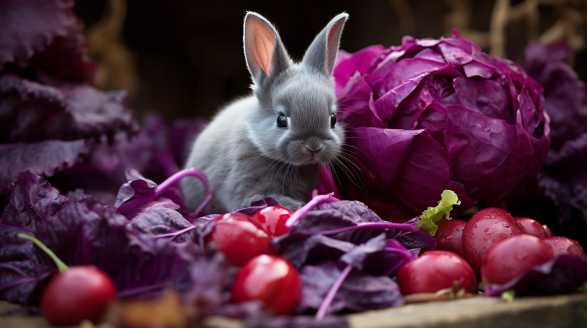
Can Rabbits Eat Red Cabbage
Introduction Hey there rabbit enthusiasts! Are you ready to dive into the colorful world of red cabbage and discover how it can be a game-changer for your furry friend’s diet? Can Rabbits eat red cabbage? Let’s find out. As a rabbit owner, let me share some insights with you. Red cabbage isn’t just a pretty […]
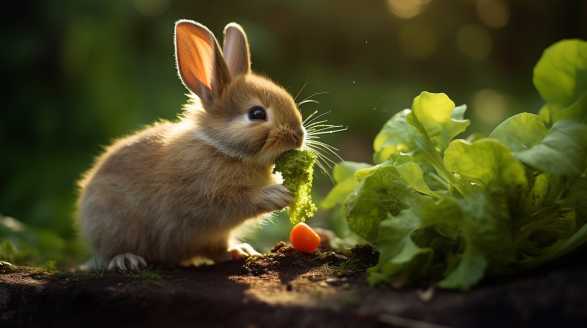
Can Rabbits Eat Lettuce
Introduction Hey there, fellow rabbit lovers! Get ready to hop into a world of leafy goodness as we explore the benefits of lettuce in your furry friend’s diet. Let me tell you, lettuce is not just an ordinary veggie. It’s packed with incredible benefits that can make your rabbit’s tail wag with joy. Oh, and […]
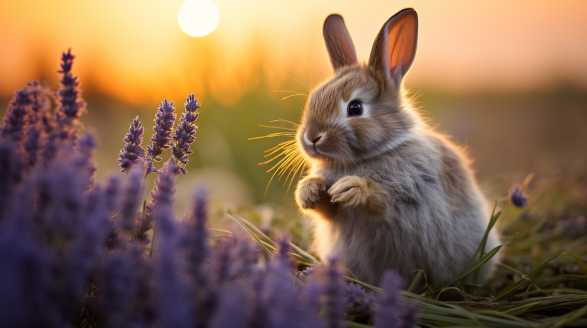
Can Rabbits Eat Lavender
Introduction Can rabbits eat lavender? Let’s find out Well, brace yourself because it turns out that lavender has some benefits for our little fluffy friends, rabbits! Yes, you heard that right – lavender can actually do wonders for your rabbit’s respiratory health. But hold on a second, let me back up and tell you how […]
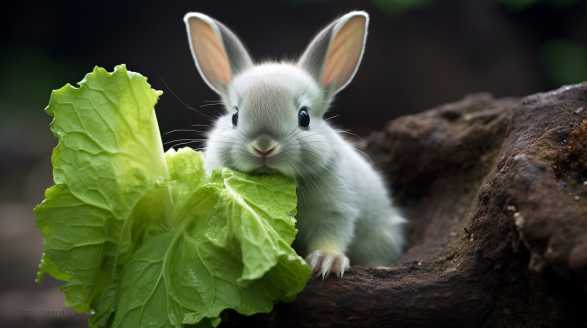
Can Rabbits Eat Napa Cabbage
Introduction Hey there, rabbit owners and enthusiasts! Are you constantly on the lookout for new ways to keep your fluffy pals happy and healthy? As someone who’s obsessed with their rabbits’ well-being, I’ve done my fair share of research into finding the best foods to keep them thriving. And, Napa cabbage is a game-changer! we’re […]
